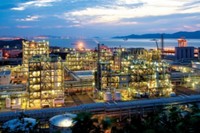Advertisement
Grab your lab coat. Let's get started
Welcome!
Welcome!
Create an account below to get 6 C&EN articles per month, receive newsletters and more - all free.
It seems this is your first time logging in online. Please enter the following information to continue.
As an ACS member you automatically get access to this site. All we need is few more details to create your reading experience.
Not you? Sign in with a different account.
Not you? Sign in with a different account.
ERROR 1
ERROR 1
ERROR 2
ERROR 2
ERROR 2
ERROR 2
ERROR 2
Password and Confirm password must match.
If you have an ACS member number, please enter it here so we can link this account to your membership. (optional)
ERROR 2
ACS values your privacy. By submitting your information, you are gaining access to C&EN and subscribing to our weekly newsletter. We use the information you provide to make your reading experience better, and we will never sell your data to third party members.
Business
Exploiting China's Coal
Petrochemicals: Western firms move to produce chemicals from the Chinese resource
by Alexander H. Tullo
November 15, 2010
| A version of this story appeared in
Volume 88, Issue 46

Three Western companies—Total Petrochemicals, Celanese, and Dow Chemical—are advancing plans to make chemicals in China based on the country’s ample supply of coal.
As prices of imported oil have climbed over the past decade, Chinese chemical makers began using domestic coal to make olefins through a route that starts with coal gasification. Now, U.S. and European firms are also turning to coal as a way to supply Chinese markets from local chemical production based on local resources.
Total and China Power Investment have agreed to study a 1 million-metric-ton-per-year polyolefins complex in China’s coal-laden Inner Mongolia region. The partners hope to complete the plant, which could cost up to $4 billion to build, after 2015. Total would use methanol-to-olefins technology and an olefins cracking process it has been testing in Feluy, Belgium.
Celanese plans to build one or two plants in China that will make coal-derived ethanol through a new process based on the company’s acetyl chemistry platform. “We are very excited about our technology advancement as it allows us to address growing demand for ethanol in industrial applications,” Celanese CEO David N. Weidman says.
Using coal as a feedstock, the Chinese plants will each have a capacity of 400,000 metric tons per year and cost $350 million apiece, Celanese says. It plans to start production about 30 months after receiving government approvals. Celanese already makes coal-based acetic acid in Nanjing, China.
In the meantime, Celanese plans to implement the ethanol technology in a 40,000-ton-per-year natural gas-based plant at its Clear Lake, Texas, complex, by the end of 2012.
Dow is redoubling its efforts on a coal-to-chemicals project that it has been studying with Chinese coal company Shenhua, in Yulin City, Shaanxi province, since 2007. The companies have submitted a Project Application Report to the Chinese government— an important milestone in advancing the plant. Despite the step forward, Dow CEO Andrew N. Liveris tells C&EN that the firm doesn’t expect to complete the complex until the end of the decade.



Join the conversation
Contact the reporter
Submit a Letter to the Editor for publication
Engage with us on Twitter